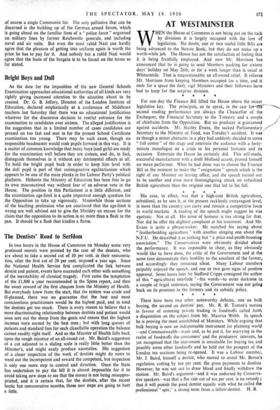. AT WESTMINSTER W HEN the House of Commons is not
being put on the rack by divisions it is largely occupied with the lees of legislation. No doubt, one or two useful little Bills are being advanced to the Statute Book, but they do not make up a worth-while job. The House has not the satisfaction of feeling that it is being fruitfully employed. And now Mr. Morrison has announced that he is going to send Members packing for sixteen days' holiday on May 26th, or for a week longer than is usual at Whitsuntide. That is unquestionably an all-round relief. It relieves Mr. Morrison from keeping Members occupied for a time, and it ends for a space the daily vigil Ministers and their followers have
had to keep for the surprise division. * * * *
For one day the Finance Bill lifted the House above the minor legislative key. The principals, so to speak, in the cast. for–tilir—■.., second reading performance are always the Chancellor of the Exchequer, the Financial Secretary to the Treasury and a couple of chieftains from the Opposition. But no producer is guaranteed against accidents. Mr. Stanley Evans, the sacked Parliamentary Secretary to the Ministry of Food, was Tuesday's accident. It was as though a minor character in a play had suddenly decided to come " full centre " of the stage and entertain the audience with a forty- minute monologue on a crisis in his personal fortunes and its occasion. Entertain the House he certainly .did. This self-made, successful manufacturer with a droll Midland accent, proved himself no mean performer. What he had done was to choose the Finance Bill as the moment to make the " resignation " speech which is the
right of any Minister on leaving office, and the speech turned out to be another and even more thoroughgoing attack on subsidised British agriculture than the original one that led to his fall.
* ' * * His case, in effect, was that a high-cost British agriculture, subsidised, as he sees it, at the present recklessly extravagant level, is more than the country can carry and remain a competitive force
in world markets. A reading of the speech might suggest he was egotistic. Not at all. His sense of humour is too strong for that. Nor did he offer the slightest complaint at his treatment. And Mr. Evans is quite a phrase-maker. He matched his saying about " featherbedding agriculture " with another stinging one about the N.F.U. He described it as nothing but " a price-and-profit-boosting association." The Conservatives were obviously divided about the performance. It was impossible to cheer, as they obviously would like to have done, the critic of the Government and at the same time demonstrate their hostility to the assailant of the farmer, and accordingly they remained silent. Many Labour members palpably enjoyed the speech, and one or two gave signs of positive approval. Some hours later Sir Stafford Cripps consigned the author of this " agricultural interlude "—his words—to outer darkness in a couple of frigid sentences, saying the Government was not going back on its promises to the farmers and its subsidy policy. * * * * There have been two other noteworthy debates, one on bulk buying, the second on dentists' pay. Mr. R. H. Turton's motion in favour of restoring private trading in foodstuffs called forth a disquisition on the subject from Mr. Maurice Webb. In speech he is proving the most uninhibited of Ministers. While arguing that bulk buying is now an indispensable instrument for planning world —and Commonwealth—trade and, as he put it, for marrying in the realm of foodstuffs the consumers' and the producers' interests, he yet recognised that the instrument is unsuitable for buying tea and possibly some other foodstuffs and he held out the prospect of the London tea auctions being re-opened. It was a Labour member, Mr. J. Baird, himself a dentist, who moved to annul Mr. Bevan's regulation cutting by ten per cent. the gross payments to dentists. However, he was not out to draw blood and finally withdrew the Motion. Mr. Baird's argument—and it was endorsed by Conserva- tive speakers—was that a flat rate cut of ten per cent is no remedy i that it will punish the good dentist equally with what he called the professional " spiv," a strong term from a fellow-dentist. H. B.










































 Previous page
Previous page